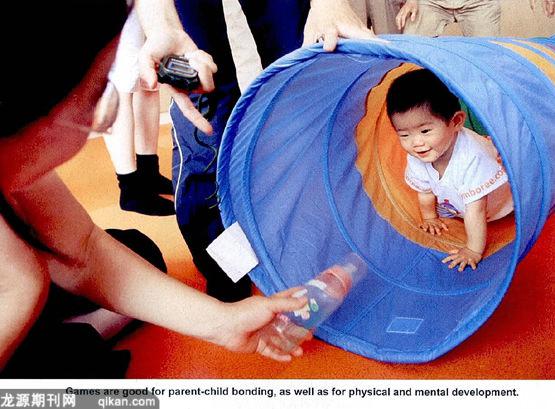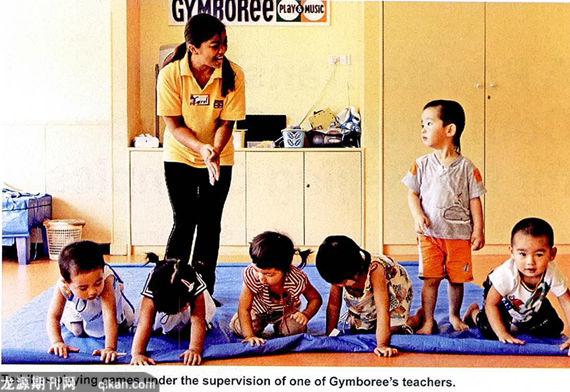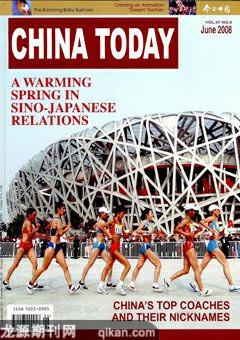The Booming Baby Business
staff reporter HOU RUILI
CHINAS long-standing one-child policy has meant that an only childs education has always been a matter of primary importance to Chinese families. But while children under three were in the past encouraged to play freely and develop physically, the growing popularity of early childhood education has meant that infants as young as six months are being enrolled in pre-school classes.
Early Childhood
Education
Zhang Ying and her baby have just completed their first parenting course at Oriental Babycare, one of the many early childhood education centers opening up around the country. “Im so exhausted! We play with them throughout the course,” she said. She is drenched in sweat from the workout, but cannot help kissing her six-month-old toddler. “He knows how to react to me. He seems to be growing up in the twinkling of an eye.”

Before giving birth, Zhang, like other expectant mothers in Chinas large cities, went through a prenatal training program. Her health was carefully monitored at a nearby hospital, and she learned how to eat properly, exercise, prepare for labor and to breast feed at the hospitals free training program for mothers-to-be.
“I listened to music, tried to maintain a peaceful frame of mind, talked with my baby and caressed it,” Zhang said. She also learned that there are many institutes engaged in early childhood education.
Oriental Babycare caught Zhangs attention with its labor preparation program. As the only partner of Lamaze International in China, it advocates the benefits of a normal birth. “The babys head is under considerable pressure during the delivery,” Zhang said. “I learned how to avoid hurting the baby and how to reduce the pain of childbirth.”
Young parents-to-be with careers understand the value of education and competitiveness. They do not want their children to lose out at the starting line, so they are enrolling them in early education classes in growing numbers. In China, most young mothers opt to continue their careers after a six-month maternal leave, and babies are usually given over into the care of grandparents or nannies. Now, however, mothers have another option. In early education institutions, babies receive formal training courses and are not overindulged.
Three-year-old Wang Jingyun is enrolled in a course at Gymboree. “She changed noticeably after just three lessons,” her mother said, rejoicing at how her daughter had become stronger and more intellectually curious. “The environment here gives them a jolt to the mind. The teachers are good communicators using language and expressions, and they have backgrounds in music. The other children around them provide babies with a rich social environment,” she said. Compared to the careful arrangement at the school, the home environment looks comparatively dreary.
Children of the World
Looking through the large French window of Gymboree in Zhongguancun, the lobby has been elaborately decorated with infants in mind. After a short rest there, some toddlers teeter after young foreign teachers into classrooms, followed by parents carrying water, food and diapers. They are off to sit in on parenting sessions taught by both Chinese and foreign instructors.
The U.S.-headquartered company has 600 chain stores around the world, including about 100 in China. The Zhongguancun flagship has received some 2,000 children since it opened in 2005. They learn games, music and arts in order to develop their coordination, communication skills and personalities, and are expected to become self-confident and sociable. Foreign languages, particularly English, are one of the keys to realizing parents dreams for their offspring.
Wang Jingyun walks out of a classroom beaming with a confidence and pride rarely seen in a three-year-old. Her mother spent RMB 20,000 for a 96-hour program, which she attends once a week. “Expensive,” she said, “but worthwhile for her future.”

There are now about 11 million babies under three in Chinas cities, 10 percent of whom grow up in affluent families with an annual income above RMB 60,000. An investment of RMB 20,000 is not an extravagant sum for people like Wang Jingyuns mother. “Gymboree aims to provide services for high-income families who mostly have experience living abroad,” said Li Ying, founder of Gymboree Zhongguancun Store. She previously worked as a senior quality manager for Motorola China for 10 years before turning to the baby business. “Parents share with us the same notions on education and method. The bilingual environment and the textbooks that are updated simultaneously worldwide are both attractive to them.”
Here, children receive a solid Western-style education. Some children are uneasy and shy when they first see a foreign teacher, and it is still not popular among Chinese parents to have their children learn English at too early an age. So Gymboree has opened its three Beijing chain stores in communities where foreigners reside, such as in Zhongguancun, Chinas silicon valley.
A Chinese Education
Chinese pre-schools, like Dongfang Aiying and Hong Huang Lan, cost about half as much as imported ones, and the lower rates make them more appealing to ordinary urban families. Their curriculums, based on traditional Chinese culture, are another factor in their favor. Many specialists on early childhood education believe that traditional music and stories are better for children who will complete their studies in China.
The enormous market potential has led to a skyrocketing in the number of Chinese pre-schools. In 2002, there were about 100 local institutions for infants all over the country. The number jumped to 2,000 only three years later.
The largest, Dongfang Aiying, has developed well-accepted courses to improve babies physical coordination, appreciation of the arts, languages, communication and logic. Its network of 200 chains covers around 100 cities, and a new store opens every seven days.
Hong Huang Lan is another industry leader, with over 150 parenting parks in 70 cities, while Golden Cradle and its 50 franchisees have focused on developing childrens potential for the past 12 years. Among children studying here, 90 percent reach or surpass 140 in IQ tests, a baseline for exceptional children, according to the Children Psychology Research Center at Beijing Normal University.
Local institutions have been battered by increasing competition since foreign schools entered the Chinese market. Around Shijicheng, a community for some 300,000 residents in Beijing, there are a dozen early education institutions. A Golden Cradle center charged RMB 28 an hour at its opening early this year, while the Dongfang Aiying chain keeps its classes down to three children per lesson.
It is widely accepted that the experiences and parenting relations babies under three receive will have a lasting impact on their later lives, said a specialist with Gymboree. Parents are indispensable in early childhood, so mothers are always encouraged to take part in the lessons. Most, however, have no time to accompany their babies. In the classroom, it is easy to tell which babies have mothers beside them, because it is they who perform best. “Maternal love is the best early education,” the specialist said.

